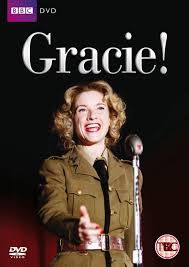
GRACIE
UK, 2009, 80 minutes, Colour.
Jane Horrocks, Tom Hollander, David Dawson, Christian Contreras, Alistair Petrie.
Directed by Brian Percival.
Gracie is one of a series made by the BBC on significant British artists. Other films include Enid with Helena Bonham Carter, a portrait of Enid Blyton. There was also a film about Margot Fonteyn.
Gracie Fields was very popular in the UK during the 1930s, on stage, as a singer, in some cheerful films. She had an exuberant personality. Here she is played by Jane Horrocks, a talented impersonator and singer (especially on stage and in the film of Little Voice). Gracie Fields was managed by the Hollywood director, Monty Banks (actually an Italian called Mario Bianchi). He admired Gracie, directed her in some films, managed her singing career. They eventually married and, after World War Two, retired to Capri.
However, there were difficulties for Gracie Fields during World War Two. Because Britain had declared war on Italy because of its fighting with Germany, Monty Banks was considered an alien. Churchill commissioned Gracie Fields to go to Canada and the United States for concerts to raise money for the War effort. She had previously sung for the troops in northern France. Banks was ordered to go to the United States and he and Gracie were separated. This put a strain on their relationship as Gracie believed the concerts should go ahead. Finally, she went to Hollywood and they were reunited.
Of significance, and a representation of the fickle public, Gracie Fields was accused of cowardice, of escaping the Battle of Britain, of smuggling money out of England, of supporting her alien husband. While she was recognised after the war, some of the residue of the criticism remained.
Tom Hollander is very good as Monty Banks and David Dawson appears as Harry Parr- Davies, Gracie Fields’ accompanist for more than fifteen years.
The screenplay was written by Nick Vivian for Jane Horrocks (his partner in real life).
1.Gracie Fields and her reputation, the 30s, singer, entertainer, actress? Her popularity? Her war effort?
2.BBC, production, re-creation of the period? The use of newsreel format to indicate developments, the war, Gracie Fields and her work? Costumes, décor, theatres? The background of the war, the fight in northern France? The contrast with Canada and the United States?
3.The musical score, the range of popular songs sung by Gracie Fields? Entertaining, morale-boosting?
4.Gracie Fields and her background, the portrait by Jane Horrocks? Age, experience? Her mother and father, the scenes with them, her old-fashioned mother, her father and his quiet patience? Her meeting with Monty Banks, his attending her concerts, persuading her to do a film? Their friendship? Her reliance on his moral support? Her illness, his being present, her parents? Urging her to marry? Her plan to rest on Capri? The war, the scene of Chamberlain’s announcement? Basil Dean and his work with Gracie in film? Organising entertainers to northern France? Her decision to go?
5.The sequences in France, her singing for the soldiers? Monty and his hesitation? Cars being stuck in the mud and the soldiers helping out (and the young soldier for whom she sang Sally interviewing her at the end after the war)? In the hotel, Christmas, Monty and his feeling hurt? Gracie and her feeling she owed things to the troops, to the English public?
6.The commission to go to Canada? The help for Monty? The war against Italy? His Italian citizenship despite his time in America, as a Keystone Kop, directing? Monty as a person, the Italian background, his devotion to Gracie?
7.The Canadian tour, the expectations? The reporters, the criticisms from England? Accusations of cowardice, avoiding the Battle of Britain? Disloyalty because of her Italian husband? The rumours about money and jewels taken out of the country? Gracie’s response, desperation? Singing and the hostility and booing of the crowd? Her encounter with the boy on the bicycle and his spitting at her?
8.The Canadian authorities, the arrest of Monty? Her appeal, the conditions for his staying, the demand that he go to America? Her decision to carry on with the concert? Monty and his gambling, life in Hollywood? Gracie moving her parents and their being with him? Her phone calls – and his refusing to speak to her?
9.Her growing desperation, the decision to go to America, seeing him with the film star, gambling? The reconciliation?
10.The portrait of Harry Parr-Davies? Welsh background, young, composer, devoted to Gracie? His own lonely life? His war effort, going to Ireland, assigned to Gracie in Canada? Supporting her?
11.Guy, the military protection, assistant? Her relying on him – finding him with the girl in the hotel?
12.The end of the war, her concert at the Palladium, the welcome and applause, the happiness for herself and for Monty?
13.The background information, Monty’s death – and Gracie’s long life afterwards. Her dying in 1979.